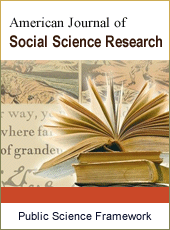American Journal of Social Science Research
Articles Information
American Journal of Social Science Research, Vol.4, No.4, Dec. 2018, Pub. Date: Dec. 6, 2018
Learning Ecologies and Indigenous Readers: An Examination of the Influence of Home Factors on Indigenous Students’ Reading Achievement
Pages: 76-83 Views: 2290 Downloads: 562
[01]
Leitha Delves, Department of Teacher Education and Professional Development, Central Michigan University, Mount Pleasant, USA.
[02]
Mingyuan Zhang, Department of Teacher Education and Professional Development, Central Michigan University, Mount Pleasant, USA.
Students learn in a complex interplay of numerous variables such as contexts, processes, relationships, affordances, and spaces. This interplay is termed as learning ecology. Each individual’s learning ecology is made up of four primary elements: the learner, the environment, their interactions with the environment, and the learning that emerges from these interactions. The purpose of this study was to examine the relationships between the reading achievement of fourth-grade Indigenous students in the United States and home factors related to material aids to reading in the home and the economic circumstances of the family. Data was gathered from the National Indian Education Survey using the National Assessment of Educational Progress (NAEP) Explorer tool. Specifically, data used for the present study was extracted from the 2015 NAEP dataset. The research methods used include quantitative descriptive analysis, correlational analysis, t-test and Cohen’s d effect size with the overall purpose of examining the relationship between home environment factors and reading achievement. The results of data analysis showed a consistent relationship between seven home environment variables selected and levels of reading achievement on the NAEP reading test. These findings may indicate an evident need for greater attention to be paid to the health of the learning ecologies of American Indian/Alaskan Native adolescents in order to identify cases where those affected by social disadvantage are likely also to be achieving academically at a lower standard than their more affluent peers.
Indigenous Reading Achievement, Home Environment Factors, Learning Ecologies
[01]
Jackson, N. J. (May, 2016). Developing the idea of learning ecologies & ecosystems for learning in higher education. Paper presented at the annual LTTC Graduate Conference, Dublin Institute of Technology, Dublin.
[02]
Barron, B. (2006). Interest and self-sustained learning as catalysts of development: a learning ecology perspective. Human Development, 49 (4), 193-224. DOI: 10.1159/000094368.
[03]
Molfese, V., Modglin, A., & Molfese, D. (2003). The role of environment in the development of reading skills, 36 (1), 59-67.
[04]
Lubienski, S., & Crane, C. (2010). Beyond free lunch: Which family background measures matter? Education Policy Analysis Archives, 18 (11).
[05]
Koppenhaver, A. H. (1982). Reading achievement as influenced by certain home factors. [Dissertation]. WorldCat.org database.
[06]
Jehangir, K., Glas, C. A. W. & van den Berg, C. (2015). Exploring the relation between socio-economic status and reading achievement in PISA 2009 through an intercepts-and-slopes-as-outcomes paradigm. International Journal of Educational Research, 71, 1-15. http://dx.doi.org/10.1016/j.ijer.2015.02.002.
[07]
Chiu, M. M., McBride-Chang, C. & Lin, D. (2012). Ecological, psychological, and cognitive components of reading difficulties. Journal of Learning Disabilities, 45 (5), 391-405. DOI: 10.1177/0022219411431241.
[08]
Hall, G., & Gandolfo, A. (2016, August 9). Poverty and exclusion among Indigenous peoples: The global evidence [Blog post]. Retrieved from http://blogs.worldbank.org/voices/poverty-and-exclusion-among-indigenous-peoples-global-evidence.
[09]
Hohlfeld, T., Ritzhaupt, A., Dawson, K. & Wilson, M. (2017). An examination of seven years of technology integration in Florida schools: Through the lens of the Levels of Digital Divide in Schools. Computers & Education, 113 (October, 2017), 135-161. http://dx.doi.org/10.1016/j.compedu.2017.05.017.
[10]
Nel, J. (1994). Preventing school failure: The Native American child. The Clearing House, 67 (3), 169-174.
[11]
Cvencek, D., Fryberg, S. A., Covarrubias, R., & Meltzoff, A. N. (2017). Self-Concepts, self-esteem, and academic achievement of minority and majority North American elementary school children. Child Development, 2017, Apr 07. doi: 10.1111/cdev.12802
[12]
Zehr, M. A. (2009). Native American students. Education Week, 28 (36), 5.
[13]
U.S. Department of Education, National Center for Education Statistics. (2015). National Indian Education Survey 2015 (NCES 2017-161). Retrieved from https://nces.ed.gov/pubsearch/pubsinfo.asp?pubid=2017161.
[14]
National Center for Educational Statistics (NCES). 2018. NAEP Data Explorer. Retrieved from https://www.nationsreportcard.gov/ndecore/landing.
[15]
Cohen, J. (1988). Statistical power analysis for the behavioral sciences (2nd. ed.) Hillsdale, NJ: Erlbaum.
[16]
Cronk, B. (2016). How to use SPSS. Glendale, CA: Pyrczak Publishing.
[17]
Fraenkel, J. R., & Wallen, N. E. (2018). How to design and evaluate research in education (10th ed.). New York: NY McGraw-Hill.
[18]
Burnett, Cathy. (2010). Technology and literacy in early childhood educational settings: A review of research. Journal of Early Childhood Literacy, 10 (3), 247-270. DOI: 10.1177/1468798410372154.
[19]
Harris, C., Straker, L. & Pollock, C. (2017). A socioeconomic related 'digital divide' exists in how, not if, young people use computers. PLoS ONE, 12 (3), E0175011. https://doi.org/10.1371/journal.pone.0175011.
[20]
Keating, D. P., & Hertzman, C. (Eds.). (2000). Developmental health and the wealth of nations: Social, biological, and educational dynamics. Guilford Press.
[21]
Bond, J., & Zhang, M. (2017). The Impact of Conversations on Fourth Grade Reading Performance--What NAEP Data Explorer Tells? European Journal of Educational Research, 6 (4), 407-417.

ISSN Print: 2381-7712
ISSN Online: 2381-7720
Current Issue:
Vol. 7, Issue 3, September Submit a Manuscript Join Editorial Board Join Reviewer Team
ISSN Online: 2381-7720
Current Issue:
Vol. 7, Issue 3, September Submit a Manuscript Join Editorial Board Join Reviewer Team
| About This Journal |
| All Issues |
| Open Access |
| Indexing |
| Payment Information |
| Author Guidelines |
| Review Process |
| Publication Ethics |
| Editorial Board |
| Peer Reviewers |


